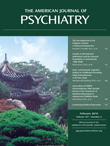Antipsychotic Drugs for Depression?
To the Editor: The Review and Overview by J. Craig Nelson, M.D., and George I. Papakostas, M.D., published in the September 2009 issue of the Journal, concluded that atypical antipsychotic drugs "are effective augmentation agents in major depressive disorder but are associated with an increased risk of discontinuation due to adverse events" (1, p. 980). This meta-analysis did not demonstrate effectiveness, only nominal efficacy against placebo. Moreover, the review is unbalanced because risk was not adequately considered.
The authors called the risk of tardive dyskinesia a "rare but serious" concern (1, p. 989). Tardive dyskinesia is serious but not rare with atypical antipsychotic drugs. A rate of 8% has been seen in delusional depression (2). Many cases are persistent, and depressed patients are especially at risk. For aripiprazole, which was the first atypical antipsychotic drug approved for augmentation in depression, a 1.1% rate of dyskinesia within 6 weeks was reported (study #CN138165; ClinicalTrials.gov registry number, NCT00105196). This translates to 11,000 cases per million exposures. Should we really give this drug to millions of nonpsychotic depressed patients? The marketer's aggressive media advertising appears to have that aim.
There is insufficient evidence of benefit to offset such risk. The trials of aripiprazole were unblinded by akathisia (25%) and other side effects that can introduce rater bias. Aripiprazole was not efficacious by self-report depression measures, i.e., patients did not find it effective. In one study cited (3), efficacy was lacking in male subjects. In the meta-analysis, the number needed to treat was nine, signifying only borderline utility in this therapeutic context. The corresponding number needed to treat for lithium is four to five. The larger numbers of patients in the evidence base for atypical antipsychotic drugs, as noted by the authors, reflect the commercial interest in penetrating the depression market, but the manufacturers of these drugs have studiously avoided testing their products against lithium. These concerns about efficacy and relative efficacy were not addressed.
Finally, there is no evidence that augmentation with atypical antipsychotic drugs is useful in the long-term. Drs. Nelson and Papakostas did not note that a study of depressive relapse prevention with risperidone augmentation was negative (4). No long-term safety or efficacy data have been posted for aripiprazole in the treatment of depression, even though a 52-week study was completed in November 2007 (ClinicalTrials.gov registry number, NCT00095745). On the basis of the presently available data, psychiatrists should be more forthright in pointing out the limited effectiveness as well as the risks and adverse effects of atypical antipsychotic drugs in the treatment of depression, especially in primary care.
1 : Atypical antipsychotic augmentation in major depressive disorder: a meta-analysis of placebo-controlled randomized trials. Am J Psychiatry 2009; 166:980–991 Link, Google Scholar
2 : A double-blind randomized controlled trial of olanzapine plus sertraline vs olanzapine plus placebo for psychotic depression: the Study of Pharmacotherapy of Psychotic Depression (STOP-PD). Arch Gen Psychiatry 2009; 66:838–847 Crossref, Medline, Google Scholar
3 : Examining the efficacy of adjunctive aripiprazole in major depressive disorder: a pooled analysis of 2 studies. Prim Care Companion J Clin Psychiatry 2008; 10:440–447 Crossref, Medline, Google Scholar
4 : Effects of risperidone augmentation in patients with treatment-resistant depression: results of open-label treatment followed by double-blind continuation. Neuropsychopharmacology 2006; 31:2505–2513 Crossref, Medline, Google Scholar



